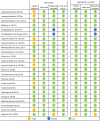Ten Years of Research on Automatic Voice and Speech Analysis of People With Alzheimer's Disease and Mild Cognitive Impairment: A Systematic Review Article
- PMID: 33833713
- PMCID: PMC8021952
- DOI: 10.3389/fpsyg.2021.620251
Ten Years of Research on Automatic Voice and Speech Analysis of People With Alzheimer's Disease and Mild Cognitive Impairment: A Systematic Review Article
Abstract
Background: The field of voice and speech analysis has become increasingly popular over the last 10 years, and articles on its use in detecting neurodegenerative diseases have proliferated. Many studies have identified characteristic speech features that can be used to draw an accurate distinction between healthy aging among older people and those with mild cognitive impairment and Alzheimer's disease. Speech analysis has been singled out as a cost-effective and reliable method for detecting the presence of both conditions. In this research, a systematic review was conducted to determine these features and their diagnostic accuracy. Methods: Peer-reviewed literature was located across multiple databases, involving studies that apply new procedures of automatic speech analysis to collect behavioral evidence of linguistic impairments along with their diagnostic accuracy on Alzheimer's disease and mild cognitive impairment. The risk of bias was assessed by using JBI and QUADAS-2 checklists. Results: Thirty-five papers met the inclusion criteria; of these, 11 were descriptive studies that either identified voice features or explored their cognitive correlates, and the rest were diagnostic studies. Overall, the studies were of good quality and presented solid evidence of the usefulness of this technique. The distinctive acoustic and rhythmic features found are gathered. Most studies record a diagnostic accuracy over 88% for Alzheimer's and 80% for mild cognitive impairment. Conclusion: Automatic speech analysis is a promising tool for diagnosing mild cognitive impairment and Alzheimer's disease. The reported features seem to be indicators of the cognitive changes in older people. The specific features and the cognitive changes involved could be the subject of further research.
Keywords: Alzheimer's disease; language impairment; mild cognitive impairment; speech analysis; speech impairment.
Copyright © 2021 Martínez-Nicolás, Llorente, Martínez-Sánchez and Meilán.
Conflict of interest statement
The authors declare that the research was conducted in the absence of any commercial or financial relationships that could be construed as a potential conflict of interest.
Figures





Similar articles
-
[Awareness disorders in Alzheimer's disease and in mild cognitive impairment].Encephale. 2014 Apr;40(2):180-7. doi: 10.1016/j.encep.2013.10.003. Epub 2014 Mar 11. Encephale. 2014. PMID: 24630532 Review. French.
-
Voice Markers of Lexical Access in Mild Cognitive Impairment and Alzheimer's Disease.Curr Alzheimer Res. 2018;15(2):111-119. doi: 10.2174/1567205014666170829112439. Curr Alzheimer Res. 2018. PMID: 28847280
-
Automatic Detection of Putative Mild Cognitive Impairment from Speech Acoustic Features in Mandarin-Speaking Elders.J Alzheimers Dis. 2023;95(3):901-914. doi: 10.3233/JAD-230373. J Alzheimers Dis. 2023. PMID: 37638439
-
Automatic speech analysis for the assessment of patients with predementia and Alzheimer's disease.Alzheimers Dement (Amst). 2015 Mar 29;1(1):112-24. doi: 10.1016/j.dadm.2014.11.012. eCollection 2015 Mar. Alzheimers Dement (Amst). 2015. PMID: 27239498 Free PMC article.
-
18F-FDG PET for Prediction of Conversion to Alzheimer's Disease Dementia in People with Mild Cognitive Impairment: An Updated Systematic Review of Test Accuracy.J Alzheimers Dis. 2018;64(4):1175-1194. doi: 10.3233/JAD-171125. J Alzheimers Dis. 2018. PMID: 30010119 Free PMC article.
Cited by
-
Longitudinal observational cohort study: Speech for Intelligent cognition change tracking and DEtection of Alzheimer's Disease (SIDE-AD).BMJ Open. 2024 Mar 28;14(3):e082388. doi: 10.1136/bmjopen-2023-082388. BMJ Open. 2024. PMID: 38548356 Free PMC article.
-
Validation of the Remote Automated ki:e Speech Biomarker for Cognition in Mild Cognitive Impairment: Verification and Validation following DiME V3 Framework.Digit Biomark. 2022 Sep 30;6(3):107-116. doi: 10.1159/000526471. eCollection 2022 Sep-Dec. Digit Biomark. 2022. PMID: 36466952 Free PMC article.
-
Clinical classification of memory and cognitive impairment with multimodal digital biomarkers.Alzheimers Dement (Amst). 2024 Feb 23;16(1):e12557. doi: 10.1002/dad2.12557. eCollection 2024 Jan-Mar. Alzheimers Dement (Amst). 2024. PMID: 38406610 Free PMC article.
-
Older adults' refusal speech act in cognitive assessment: A multimodal pragmatic perspective.Front Psychol. 2023 Feb 1;14:1026638. doi: 10.3389/fpsyg.2023.1026638. eCollection 2023. Front Psychol. 2023. PMID: 36844331 Free PMC article.
-
Novel Screening Tool Using Non-linguistic Voice Features Derived from Simple Phrases to Detect Mild Cognitive Impairment and Dementia.JAR Life. 2023 Aug 23;12:72-76. doi: 10.14283/jarlife.2023.12. eCollection 2023. JAR Life. 2023. PMID: 37637273 Free PMC article.
References
-
- Alonso J. B., De Leon J., Alonso I., Ferrer M. A. (2001). Automatic detection of pathologies in the voice by HOS based parameters. EURASIP J. Appl. Signal Process. 4, 275–284. 10.1155/S1110865701000336 - DOI
-
- Boersma P., Weenink D. (2007). PRAAT Manual. Version 5.0.20. Amsterdam: University of Amsterdam, Phonetic Sciences Department.
Publication types
LinkOut - more resources
Full Text Sources
Other Literature Sources
Miscellaneous

